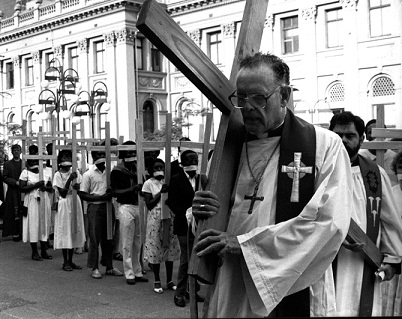Updated March 2022
Denis Hurley was consecrated a bishop 75 years ago.
He was a courageous opponent of South Africa's aparthied regime for 50 years, dubbed "an ecclesiastical Che Guevara" by a South African politician and "guardian of the light" by Alan Paton. He was a champion of the reforms and spirit of Vatican 2 which he regarded as the highlight of his life.
Born in Cape Town in 1915 of Irish parents, he became the youngest Catholic bishop in the world in 1947, at 31years of age, and archbishop of Durban in 1951. He retired as archbishop in 1992, becoming chancellor of the University of Natal from 1993 to 1998. He continued to work as parish priest of Emmanuel Cathedral well into his eighties.
Updated March 2024
20 YEARS SINCE THE DEATH OF ARCHBISHOP HURLEY
It has been a profound month for us at the DHC as we marked 20 years since the passing of Archbishop Hurley who died on 13 February 2004.
He was almost 90 when he died and his life spanned a century of significant history for the world, for South Africa and for the Church. When he was born in 1915, the First World War was in full flight; he lived through the Second World War – having rushed to finish his priestly studies in Rome so he could get out of Fascist Italy; and he lived to see the end of the Cold War and the start of the wave of terrorism that has beset the 21st century. In South African terms, his birth happened soon after the first legislation that restricted the rights of non-white citizens; he became bishop in 1947 just before the election of the Nationalist Party; and he retired as archbishop in 1992 on the eve of the first democratic elections for which he had fought so hard.
In Church terms, he was born into a Church which had just condemned what it saw as the threat of modernism; he matured as a young priest and a very young bishop as the Church embraced new theologies and reached out to other Christians and other faiths; and then after Vatican II +Hurley spent the last 40 years of his life shaping a Church that was very definitely ‘in the modern world’.
His life is a useful lens through which to see the movements of the 20th century; the timeline in our museum at the DHC lays this out very clearly.
The 20 years since his death have also been momentous for the world, for South Africa and for the Church – in some ways progressive causes for which +Hurley fought have been set back; many of the promises of liberation at the turn of the millennium have been slow to be realised.
The weekend before his death anniversary, with the gracious permission of Archbishop Jwara, special Masses were held in +Hurley’s memory at Emmanuel Cathedral Durban and prayers said at his shrine (since, as is usual for bishops, he is buried in the cathedral which was once his). The guest preacher was Fr Mike Lewis SJ who, as a young priest, had worked in this archdiocese in Elandskop and who went on to be the convenor of all the Jesuit provincials of Africa.
Fr Mike recalled the care that +Hurley took, making time to visit parishes (often unannounced) and listen to the problems faced by him as a young priest and offer pastoral solutions. He remembered how +Hurley managed to combine his huge national role in the struggle against Apartheid and his international role in modernising the Church, with a care for the local and the personal: "He always made the person he was speaking to feel as if they were the most important person in the world – just as Jesus did.” Fr Mike drew a comparison between how Jesus treated the leper in the Gospel for that Sunday (Mk 1:40-45), Hurley’s care for individuals, and the care for the most marginalised shown at the centre that carries his name.
An article celebrating +Hurley’s model of leadership appeared in 'The Mercury' on the day of his death anniversary: click here to read.

Denis Hurley pages